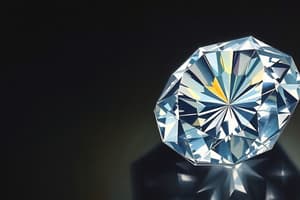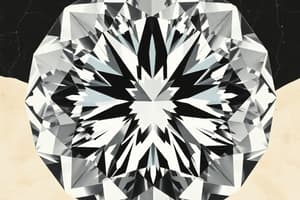Podcast
Questions and Answers
What does it mean when a diamond is described as 'improvable'?
What does it mean when a diamond is described as 'improvable'?
- It has significant inclusions that cannot be improved.
- It can be enhanced to a VVS1 or VVS2 grade. (correct)
- It can be restored to a lower grade than initially assessed.
- It is already at its highest possible clarity.
Which primarily factor needs to be considered before a diamond is recutting?
Which primarily factor needs to be considered before a diamond is recutting?
- The color of the diamond.
- The size of inclusions.
- The value of the finished diamond (correct)
- The weight of the diamond.
What is one key consideration when repolishing a diamond?
What is one key consideration when repolishing a diamond?
- It addresses minor faults in clarity or finish. (correct)
- It guarantees an increase in overall carat weight.
- It should correct only extreme damage.
- It can only be done if the diamond is flawless.
Why is it important for a grader to observe reflections when assessing a diamond?
Why is it important for a grader to observe reflections when assessing a diamond?
What should be known before recutting a diamond for sale?
What should be known before recutting a diamond for sale?
What largely governs its style when recut?
What largely governs its style when recut?
Cutters usually work with angles rather than percentages, so ........
Cutters usually work with angles rather than percentages, so ........
Diamond that can be repolished to improve clarity to an Internally Flawless grade is ....?
Diamond that can be repolished to improve clarity to an Internally Flawless grade is ....?
Repairing damage or refashioning a polished diamond to improve its clarity, proportions, or color, or to modernize an old-style cut is ........
Repairing damage or refashioning a polished diamond to improve its clarity, proportions, or color, or to modernize an old-style cut is ........
A mounting almost always.........
A mounting almost always.........
What is the key to accurate weight estimation?
What is the key to accurate weight estimation?
What can affect the accuracy of estimated weight?
What can affect the accuracy of estimated weight?
Diamonds in jewelry are ........
Diamonds in jewelry are ........
Today, there’s equal interest in maintaining or creating ...........
Today, there’s equal interest in maintaining or creating ...........
The weight correction factors for fancy cuts allow
for .........
The weight correction factors for fancy cuts allow for .........
What do appraisers assign to small mounted diamonds when clarity grading?
What do appraisers assign to small mounted diamonds when clarity grading?
Flashcards
Diamond Recutting
Diamond Recutting
Repairing damage or refashioning a polished diamond to improve its clarity, proportions, color, or to change its cut style.
Improvable Diamond
Improvable Diamond
A diamond that can be repolished to improve clarity to a VVS1 or VVS2 grade.
Diamond Mounting Limits Assessment
Diamond Mounting Limits Assessment
A diamond's mounting (setting) often hides or obscures details for accurate evaluation.
Weight Estimation Practice
Weight Estimation Practice
Signup and view all the flashcards
Fancy Cut Weight Corrections
Fancy Cut Weight Corrections
Signup and view all the flashcards
Study Notes
Diamond Grading and Concepts
- Diamonds can be repolished to improve clarity (VVS1 or VVS2 grade) or potentially to Internally Flawless grade.
- Recutting repairs damage or refashions a polished diamond improving clarity, proportions, or color, to modernize an older style cut.
- Repolishing refinishes a polished diamond to fix clarity or finish flaws.
Key Diamond Concepts
- A mounting often hides features of a diamond.
- A grader may use light reflections to discover inclusions hidden by prongs.
- Practice improves accurate weight estimation.
- Proportions (girdle thickness) affect weight estimation accuracy.
- Estimated weight estimations may vary from actual weights in certain cuts.
- The value of the finished diamond guides recutting decisions.
- Variations in cut (fancy cuts), may not appear in rounded diamonds.
- Diamonds are vulnerable to damage in jewelry.
- Modern cuts and old-style cuts are equally important today.
- Original cutting style influences the final recut style of a diamond.
- Market demand impacts recut shape choices.
- Jewelers typically use angles over percentages for cuts.
Studying That Suits You
Use AI to generate personalized quizzes and flashcards to suit your learning preferences.




